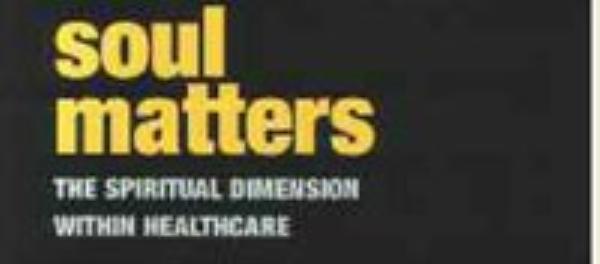As a General Practitioner working in primary health care in Lewisham and a specialist member of the Faculty of Homeopathy, Mabel Aghadiuno is no stranger to the poverty and hardship of many of her patients. Yet neither is she a stranger to the importance of prayer and the spiritual dimension which contributes to holistic care: as an active member of a Focolare community, she constantly draws upon the power of prayer in her work. In Soul Matters: The Spiritual Dimension within Healthcare, she explores the spiritual aspects of wellbeing and how these can be addressed in healthcare practice.
Precisely because Soul Matters arises from a practical and personal engagement with both hands-on medicine and an active prayer life, it is a book that is relevant to anybody involved in healthcare and beyond. Written with a beautiful simplicity, it follows an academically accepted format which gives it a professional authority. At the same time, it is personal, sincere and insightful.
The Foreword is written by Christopher Dowrick, Professor of Primary Medical Care at Liverpool University. He writes:
Drawing on a wonderful diversity of sources, including literature and the arts, recent research and – above all – patient narratives and her own clinical experience, [Aghadiuno] elegantly explores the intricate connections between spirituality and healthcare.
The sources certainly are diverse: photographs of thought-provoking sculptures and excerpts from Thomas Hardy, Kafka, C. S. Lewis, Tolstoy and Virginia Woolf are unexpected encounters in a book on healthcare. In Aghadiuno’s list of acknowledgements, Philosophy for Dummies is an encouraging reference for anybody who might otherwise anticipate a ponderous treatise! She also makes use of vignettes and case studies drawn from her general practice. She is a doctor writing for healthcare practitioners and is thus perfectly entitled to expect that there is a shared knowledge upon which she can build. However, because she is writing primarily about spiritual matters rather than disease, this book is also accessible to non-medics. It is possible to skip the ‘big words’ and concentrate on the spiritual matters which are the main focus.
Soul Matters covers six main areas of spiritual healthcare. The first chapter, entitled, ‘Holistic view of health and illness’ uses a biopsychosocial model to highlight the complex interplay between the spiritual, physical, psychological, mental, cultural and social influences on wellbeing. This is a fascinating chapter which points out as many reasons why patients might seek alternative therapies as why they might look for a medical doctor. Dickens’ Bleak House demonstrates why poor social circumstances can lead to chronic sickness and early death; King Lear and Sense and Sensibility likewise manifest other imbalances. Aghadiuno highlights the value of a multi-faceted framework for truly holistic care by using the old Indian fable of the six blind men and the elephant. To limit healthcare to a single perspective is as problematic as depending on the testimony of only one man’s experience of an elephant!
In her second chapter, ‘Are we spiritual?’, Aghadiuno perhaps summarises the whole thrust of her thought and conclusions with a quote from Teilhard de Chardin: ‘We are not human beings on a spiritual journey. We are spiritual beings on a human journey.’ Quoting other sources such as The Who, Sir Alistair Hardy, Jung, C.S. Lewis and OFSTED, and referring to books such as Watership Down, Duncton Wood and The Problem of Pain, she proposes that people are born to search for meaning and answers to the question, ‘Who are you?’ She concludes that ‘spirituality concerns the sense of meaning and purpose of life – it concerns issues such as illness, death, suffering – life in its light and shadows. People have been “about spirituality” for thousands of years’.
The third chapter, ‘The neglected dimension of health’ begins with an observation that the spiritual components of human life were more visible in ancient cultures than in our own society. Yet the frenetic busy-ness that characterises so many lifestyles today is because so many ‘feel as if we are a tiny particle in a vast hole… sometimes without the language to articulate what we actually experience or question.’ Using excellent examples and quotes Aghadiuno shows that to neglect spiritual healthcare is often to place an obstacle on the path to physical and psychological health. Admitting some scepticism concerning homeopathy, she also says that she has, in her own practice, ‘had to set aside some of my scepticism and concede that I obtained results that I could not explain’. She suggests that homeopathic success is perhaps based on its holistic approach which does not deny the spiritual component to human life.
In the fourth chapter, ‘Patient narratives’, Aghadiuno includes excerpts from discussions with her patients in which they reveal the deeper spiritual questions and realisations which have formed part of the journey of their illness, and in some cases have helped them come to terms with their sickness or perhaps to recover their health. The chapter concludes with a vital paragraph which demands a response, not only from health practitioners, providers and chaplains, but also from society at large and crucially from Government as it formulates national and local policies:
Professional carers and medical staff alleviate physical pain, treat illness… and look to the local minister or hospital chaplain… However, what if doctors and nurses attribute suffering in a patient to physical pathology when in fact the problem is a spiritual one? What if the patient’s depression is at an impasse not because of the “wrong medication” but because of an unidentified and unrecognised spiritual crisis? What if the patient does not feel motivated to take medication because life has no meaning?
‘Spiritual distress’, the penultimate chapter in Soul Matters focuses directly on several psychological aspects of wellbeing that impinge directly on physical health, but which might not be considered by health practitioners as a possible underlying cause of illness or slow recovery. Aghadiuno quotes A.W. Frank, who pointed out:
One of our most difficult duties as human beings is to listen to the voices of those who suffer. The voices of the ill are easy to ignore… These voices bespeak conditions… that most of us would rather forget… in listening for the other, we listen for ourselves.
She also lists 20 stressful life events in which patients believe that clergy could help their concerns: they may have no pathology, but, impacting negatively on daily life, they inevitably affect health. Despair, helplessness, anger, guilt, disconnection and fear may be communicated ‘through symptoms and signs such as withdrawal, anxiety, denial, apathy, anger, irritability, emotional distress and difficulty [in] sleeping. The important thing for the healthcare practitioner is not to reach immediately for an antidepressant…or… to pretend the problem is not there.’
The final chapter, ‘Becoming better acquainted’ draws together the complex themes of the whole book. However most of the chapter is a collection of touching excerpts from the writings of Chiara M, an Italian woman who has a severe, painfully disabling, chronic illness, as she tried to cope with her own illness and suffering. Chiara M eventually reaches not only acceptance and meaning for herself but also for others who are associated with her. This is a journey which beautifully illustrates Aghadiuno’s thesis, that healthcare must include attention to life’s spiritual aspects if it is to be holistic.
Doctor Mabel Aghadiuno has written a Catholic, Christian book about healthcare, but has done so in a way that makes it available to people of all faiths and none, and all levels of expertise. Here’s to volume two!
The reviewer, Sr Janet Fearns FMDM, is Communications Coordinator for Missio.
![]() Find this book on the Radcliffe Publishing web site
Find this book on the Radcliffe Publishing web site
![]() Shop for this book on Amazon, giving a 5% cut to the Jesuit Refugee Service, UK
Shop for this book on Amazon, giving a 5% cut to the Jesuit Refugee Service, UK






